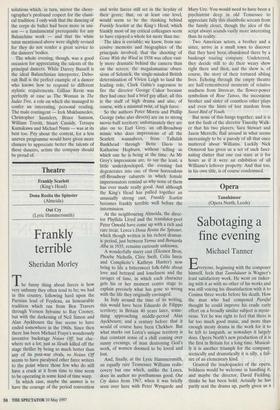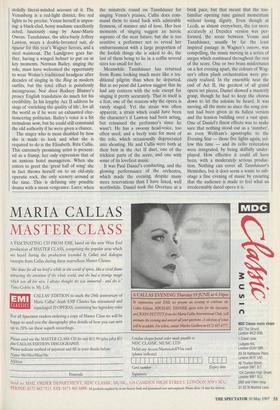Opera
Tannhauser (Opera North, Leeds)
Sabotaging a fine evening
Michael Tanner
Everyone, beginning with the composer himself, feels that Tannhauser is Wagner's least satisfactory work. He went on tinker- ing with it as with no other of his works and was still voicing his dissatisfaction with it to Cosima three weeks before his death. How the man who had composed Parsifal thought he could improve his crude early effort on a broadly similar subject is myste- rious. Yet he was right to feel that there is far too much good music, and more than enough meaty drama in the work for it to be left to languish, as nowadays it largely does. Opera North's new production of it is the first in Britain for a long time. Musical- ly it is another triumph for the company; scenically and dramatically it is silly, a fail- ure of an elementary kind.
Granted the inadequacies of the opera, boldness would be welcome in handling it, and maybe the director, David Fielding, thinks he has been bold. Actually he has partly sent the drama up, partly given us a stolidly literal-minded account of it. The Venusberg is a red-light district, five red lights to be precise. Venus herself is impos- ing: a black-clad, bossy madame excellently acted, lusciously sung by Anne-Marie Owens. Tannhauser, the ultra-burly Jeffrey Lawton, wears a double-breasted suit, de rigueur for this year's Wagner heroes, and a steel waistcoat. The Landgrave goes fur- ther, having a winged helmet to put on at key moments. Norman Bailey, singing the role, must have welcomed the opportunity to wear Wotan's traditional headgear after decades of singing in the Ring in modern outfits, but the total effect is pointlessly incongruous. Nor does Rodney Blumer's prosey English translation do much for his credibility. In his lengthy Act II address he sings of 'enriching the quality of life', for all the world as if he were an exhausted elec- tioneering politician. Bailey's voice is a bit tremulous now, but he could still command the old authority if he were given a chance.
The singer who is most disabled by how she is made to look and what she is required to do is the Elisabeth, Rita Cullis. This extremely promising artist is present- ed as a frump, her only expression that of an anxious hotel manageress. When she enters to greet the 'great hall of song' she in fact throws herself on to an old-style operatic rock, the only scenery around at the time. This is defusing any possible drama with a mean vengeance. Later, when the minstrels round on Tannhauser for singing Venus's praises, Cullis does com- mand them to stand back with admirable firmness, of manner and of tone. Her best moments of singing suggest an heroic soprano of the near future; but she is too sensitive a performer not to reveal her embarrassment with a large proportion of the foolish things she is asked to do, the last of them being to lie in a coffin several sizes too small for her.
Meanwhile Tannhauser has returned from Rome looking much more like a tra- ditional pilgrim than when he departed. But at no point did Lawton suggest that he had any concern with the role except for singing it pretty accurately. That in itself is a feat, one of the reasons why the opera is rarely staged. Yet the strain was often apparent, a strain which could have been the character's if Lawton had been acting, but remained the performer's since he wasn't. He has a swoony head-voice, too often used; and a beefy tone for most of the role, which occasionally degenerated into shouting. He and Cullis were both at their best in the Act II duet, one of the trickiest parts of the score, and one with some of its loveliest music.
It was Paul Daniel's conducting, and the glowing performance of the orchestra, which made the evening, despite many more reservations than I have listed, well worthwhile. Daniel took the Overture at a brisk pace, but that meant that the too- familiar opening tune gained momentum without losing dignity. Even though at Leeds, as almost everywhere, the (or more accurately a) Dresden version was per- formed, the scene between Venus and Tannhauser, usually by far the least inspired passage in Wagner's oeuvre, was compelling, the music moving in a series of surges which continued throughout the rest of the score. One or two brass misfortunes on a hot evening apart, the colours of Wag- ner's often plush orchestration were pre- cisely realised. In the ensemble near the end of Act II, the greatest of all grand opera set pieces, Daniel showed a masterly grasp, though he had to keep the chorus down to let the soloists be heard. It was moving, all the more so since the song con- test had been given in its fullest version and the tension building over a vast span. One of Daniel's finest effects was to make sure that nothing stood out as a 'number', so even Wolfram's apostrophe to the Evening Star — those five lights again, yel- low this time — and its cello reiteration were integrated, by being skilfully under- played. How effective it could all have been, with a moderately serious produc- tion. Nothing can cover all Tannhauser's blemishes, but it does seem a waste to sab- otage a fine evening of music by ensuring that the audience is made to feel what an irredeemably dated opera it is.



































































 Previous page
Previous page